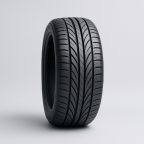
Green driving tips that'll save you hundreds of pounds on fuel
As more UK cities get set for Clean Air Zones in 2021 and Ford Fiesta ditches diesel due to lack of demand, the importance of eco-friendly driving is rapidly rising.
Whilst electric vehicles are the greenest options for motorists, not everybody is in a position to head out and buy a new model right now.
With that in mind, we’ve rounded up some top tips that will not only help you become a greener driver, but potentially save you a ton of money on fuel, too.
Uswitch car insurance expert, Florence Codjoe, said: “Taking the time to assess your style of driving could really pay off in the long run. By making simple changes to your driving habits you could reduce your carbon footprint and save hundreds of pounds on fuel. Harsh braking, under inflated tyres, and even keeping your boot full of junk, will increase your fuel consumption.”
Keep your tyres inflated
If your tyres are under-inflated your car’s engine will have to work harder to get them turning properly, which means you’ll be using more fuel and losing money as a result.
As tyres gradually lose air over time, it’s essential to check your tyre pressure once a month if you want to make your car greener and save cash. This is a small job that can make a huge difference to how much petrol or diesel you use, as being under-inflated by 6psi can increase your fuel consumption by 1 per cent. On the flip side, correctly inflated tyres can improve your mileage per tank by up to 3 per cent, which could save you hundreds of pounds over time.
Tyre pressure also affects how quickly you can brake, your accuracy in handling corners, and overall stability of the car, which increases your risk of having an accident, and could even invalidate your car insurance.
If you aren’t sure how much pressure your tyres need, the suggested amount is usually printed on the inside of your car door on the driver’s side, or in your handbook..
Clear out your boot
Whilst it might be a pain to remove the roof rack or clear out all the junk from your boot, taking the time to do this will make your car much more energy efficient in the long run.
A vehicle's weight is an important factor in how much fuel it will consume. The heavier the vehicle, the more energy it needs to get moving. Extra weight also increases a vehicle's rolling resistance, which is a force that resists forward motion as the wheels roll over the road. This means all that extra weight is actually dragging you back!
Roof racks are a prime offender, as they create a ‘wind drag’, and slow your vehicle down. Alongside this, having the windows down when driving at a high speed also makes your car use more fuel and energy, which we know is bad for the environment.
Keep your windows clean
There’s nothing worse than noticing your windows steaming up when you’re out on the road. To help us clear the condensation, most of us quickly crank up the air-con which increases fuel and energy consumption.
In fact, blasting your air-con can add up to 10 per cent to fuel consumption, and is especially apparent at lower speeds.
However, if you want to save money and be a greener driver, there is a simple solution.
By keeping the inside of your car windows squeaky clean, you can completely avoid your windows misting up. Anti-fog products coat the window so that no moisture can cling to it, and also make it less likely to accumulate dust and oil.
Don’t wait for your car to warm up when it’s cold
As the winter mornings draw closer, a lot of drivers will no doubt be dreading heading out to their cold cars. If you’re one of the many motorists who let their car engines warm up on the driveway before hitting the road, you could actually be damaging your car, not to mention the environment.
Cars pollute more when they are cold and the quickest way to warm them up is to drive. Idling at any temperature is a waste of fuel because the engine is running and you're not going anywhere. If it takes you 10 minutes to warm up your car, you're losing petrol at a rate of 2p to 3p every minute.
Alongside this, leaving your car to warm up whilst stationary actually reduces the life of the car’s engine as it strips away oil from the cylinders and pistons.
So, if you want to be more efficient, the best thing to do is start your car, remove the snow and ice from the windows and then get on your way.
But don’t go racing off as if you’re a Formula 1 driver, as speeding off just puts extra strain on the engine!
Stick to the speed limit
Breaking the speed limits will not only result in a fine or points on your license but will also add to your carbon footprint. Over 15 million people in the UK are guilty of busting the 70mph limit, adding 890,000 tons of carbon emissions each year.
Not only will driving slower help you become a greener driver, it will also save you money on fuel. Drive at 70mph and you’ll use up to 9 percent more than at 60mph, and up to 15% more than at 50mph. Pushing it up to 80mph can use up to 25 percent more fuel than at 70mph.
Avoid sharp braking and accelerating
Revving your engine and harsh braking can take its toll on your car and your carbon footprint, so try to keep your speed at a nice, steady pace and keep your distance from the driver in front if you want to be a green driver.
Harsh braking is said to use up to 30 percent more fuel and damage your brakes over time, which means you could also save yourself a small fortune by taking more caution when out on the road. As braking sharply often results in traffic slowing to a near stop due to the delayed reaction of drivers behind, by observing the three or four cars ahead, it becomes easier to anticipate and judge the necessary speed.
Get in the right gear
Did you know that the quicker and smoother you move up a gear the more fuel you will save? In fact, fuel consumption can be reduced by 10 to 30 percent by simply moving up a gear rather than accelerating up to the red line on the rev counter. Dropping into lower gears and driving at higher revs will increase your fuel consumption.
It’s recommended that you change between 1,500 and 2,500 rpm as this can help to reduce your fuel consumption by as much as 15 percent — thus releasing less toxicity into the atmosphere.
With older vehicles, gear changing was a necessary action, used to help slow the car down. However, with today’s cars, it’s possible to slow without going down the gears, meaning that to drive economically, you don’t have to move through the gears one by one before stopping.
Monitor your fuel consumption
If you’re trying to be a greener driver, it’s definitely worth monitoring your fuel consumption so you can watch that number decrease! In a lot of modern cars, the number of miles per gallon you are averaging is displayed on the dashboard, however you can also record your mileage each time you add fuel. Divide the total mileage covered since your initial garage visit by the total number of litres used – and multiply by 4.54 to get the miles per gallon figure.
You’ll quickly start to see how many miles your car is doing to the gallon and how much cash your starting to save.













